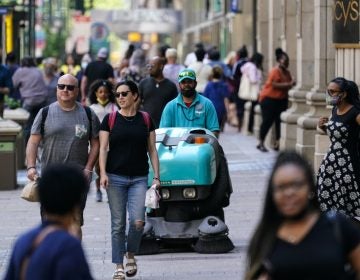Author Janet Mason shares memories and process in reading Tea Leaves
How does one process a mother’s mortality and honor her life, her history and her influence? Author, Janet Mason, found the answer in her writing. The resulting book, Tea Leaves: A memoir of mothers and daughters, documents that journey. Mason shared readings from Tea Leaves in her Mt. Airy neighborhood twice this past week at the Lovett Memorial Library last Tuesday and at the Big Blue Marble bookstore on Friday.
Mason’s mother, Jane, was diagnosed with late stage cancer in 1993, after being initially misdiagnosed. Mason did what comes naturally to an only child – she assumed the role of primary caregiver. She had six months left with her mother. In that time, Mason not only handled the “immense responsibility” of caring for a terminally ill parent, but also recorded those experiences, family stories, memories, history and learned how they shaped three generations of women.
Mason told the small group at Lovett Library that it took her five years to write Tea Leaves. Her process involved no laptop, only a few notebooks in which she would retreat to her old bedroom in her parents’ house to write. “If you don’t write down experience as you had it, it gets lost,” Mason advised. “There’s no way you can remember this stuff.”
Though written as a memoir,” the book isn’t just me,” Mason said. She stated that her mother, Jane, her maternal grandmother, Ethel, her life-partner, Barbara and the city of Philadelphia are all major characters in the story. In writing, Mason sought to discover what it is that makes us all who we really are. Mason, who calls her mother “my creation story” in the book and writes of how conversations from past generations inform the conversations of present. Mason shared that she grew up seeing the world in part through her mother’s eyes.
The memoir gets its title from an admission from Mason’s mother, after she had first sought medical attention, that her own mother (Mason’s maternal grandmother, Ethel) used to read tea leaves. Tea leaves and what they could portend are a motif which appear again in the book.
At Lovett Library, Mason read from a passage where she playfully asks her mother to look at the tea leaves at the bottom of her empty tea cup and read them.
Her mother reluctantly obliges and tells Mason that they look like a car. Like a kind of Rorschach test, they bring forth the memory of the pink Plymouth Fury bought when Mason’s parents first were married. For Mason’s father, who grew up in Fishtown, ownership of a car represented what he wanted most in the world. Where her father came from “a car meant you were a big deal,” Mason explained. When Mason turned the table and asked her mother what she had wanted most in the world, the answer was blunt. “No one ever asked what I wanted,” she quipped.
Such was the case for women in those days, particularly in blue collar families. Mason realized that a working class “culture of no complaints” had been passed on as tradition in her family. As had breaking dishes in anger. Labor history and feminism were so interwoven in the fabric of her family’s history that they, too, were passed on like genes.
During the six months of her mother’s illness, Mason read up on the Labor Movement, particularly about the textile mills to supplement the information told to her by her mother. “I gave it poetic justice in some ways,” she admitted.
Mason finished her memoir right after the September 11 attacks and her New York City agent had difficulty finding interest. A decade later, she hooked up with a small lesbian publisher, Bella Books and Tea Leaves was published in April. Bella Books asked Mason to expand role of Barbara, her partner for the past 30 years. Including more about their lesbian relationship and her parents’ acceptance is something which Mason says “makes it more universal.”
Mason, a former Temple University professor, now teaches a writing workshop “How to tell your story” through the Mt. Airy Learning Tree. Some of her students from that workshop were in attendance at the Lovett Library reading.
Mason who describes her mother as a atheist, feminist, hopeless realist and an amazing storyteller always encouraged Mason’s writing. “I got a lot of validation,” she said. Through her published poetry and literary commentary on This Way Out radio program, Mason has pursued her creative dreams in a way her foremothers never could, making good on the advice of an early therapist who once told her, “You’re the only one who can write the story about your life.”
WHYY is your source for fact-based, in-depth journalism and information. As a nonprofit organization, we rely on financial support from readers like you. Please give today.




